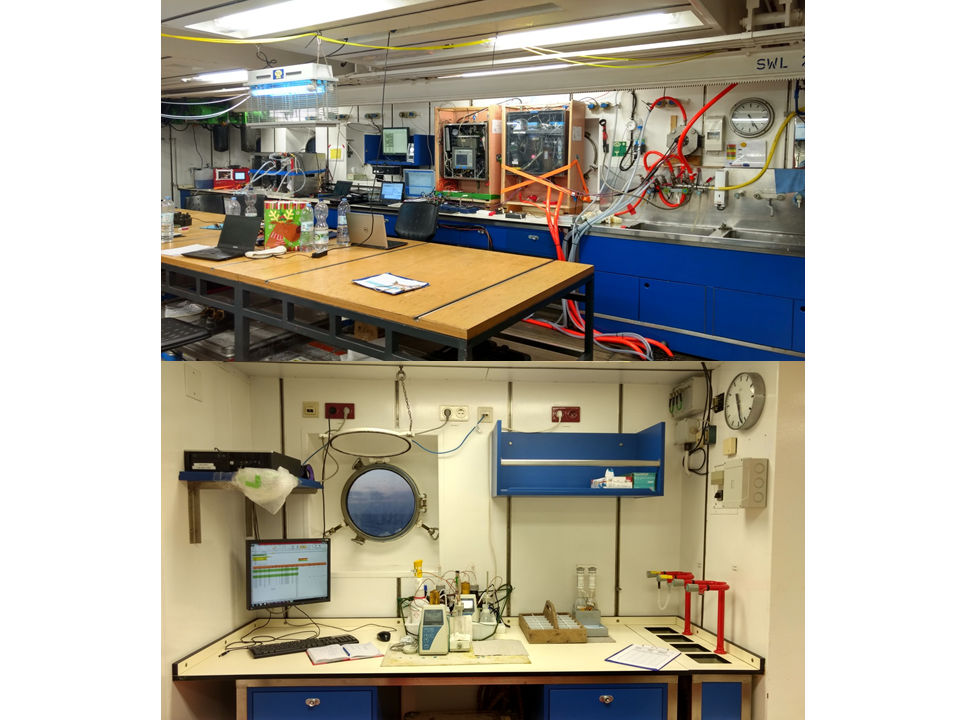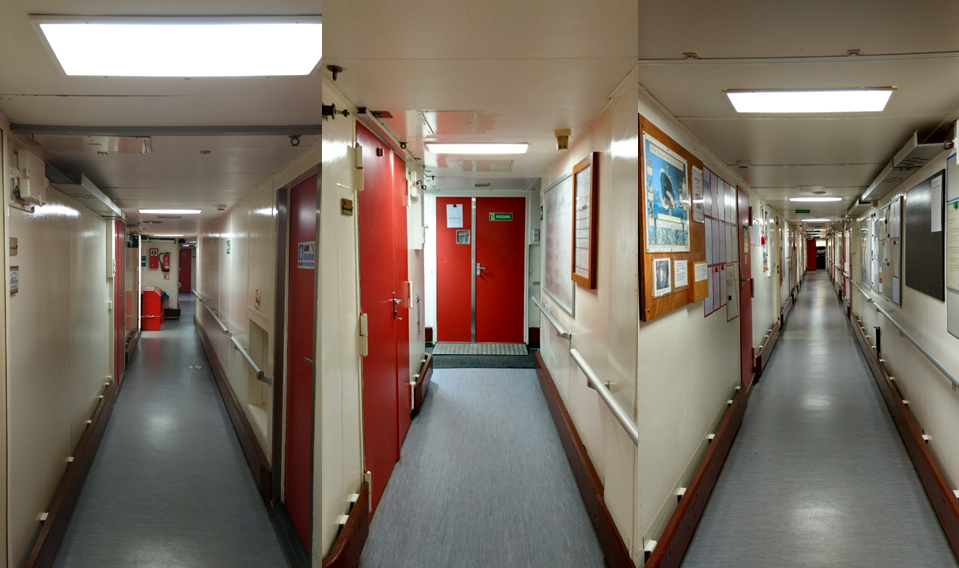Rrrriiiiiinnnnnngggg. The nerve-killing noise of the alarm clock pulls me out of my sound sleep and I eventually succeed in opening my eyes. It’s still pitch black outside. Just for a glimpse of a moment, I wish the impaired hearing on my left-ear was enough to overhear this mechanical “GET UP” scream. Actually the reduced hearing was quite convenient when I was still a little teenager. I was afraid of thunder. An easy way of dealing with the anxiety was pressing my well working right ear into the pillow. Both hearing channels blocked, perfect.
Well, as you can guess, it didn’t help me this morning. Now that I’m awake and the only thing my eyes had to do so far was blocking light from the bright screen of my mobile, my ears however are already very occupied. It’s then that I realized how much my ears have to deal with during one single day at sea on the research vessel Meteor.
I’m still in the flat position in bed, but there are at least four sounds that I already process: The constant, dull background noise pulsing from the engine room. The everlasting, loud blow of air from the slits of the air conditioner. Waves smashing against Meteor. And unusual noises from an apparently dying fridge. Really, there is no escape from these sounds for the four weeks on our research expedition.
Right after getting up, another continous, stressful baseline task for the ear sets in: balancing the ship movement. An amazing, powerful and sensitive organ. Just a few moments later when I flush the toilet, the vacuum system like in airplanes noticably reminds me that it doesn’t take waste water quietly. This specific yell sometimes still scares the hell out of me.
It’s time to start my 4-8am shift. The first destination of my day is the central Geolab, done by a short walk, as mostly here, from my cabin. The Geolab is one of my two main working labs and a general meeting point for crew and scientists. I walk through a red gate. What awaits me behind that door remains unknown and a surprise until I open it, every morning.
First, are my devices for continous measurements of parameters like oxygen and carbon dioxide in the surface ocean still running? All these measurement systems in our complex setup are supplied with surface water pumped from the bottom of Meteor at about 5.70m water depth. I’m normally quite relaxed about this question as it is the easy one to answer. So far, most of the systems run well.
However, the other, second question is what music will be played. Very hard to predict. It tuned throughout all kind of different genres so far. As the usual night time doesn’t exist on a 24/7-working research vessel, it happens that you hear ACDC banging from the speakers at 3:45am in the morning. Not the way to get my good-morning smile.
It’s time to take discrete oxygen samples in the sink. I let water run through the sampling bottles. You can hear the bubbling, dripping, flowing and sucking of water all the time from our setup. During our cruise there wasn’t just water in bottles though. When Meteor danced in the three to four meter waves, the sinks for the outflowing seawater from our systems sometimes did the opposite. Water came back up and slowly wet the Geolab. This, you could hear coming a few seconds before. However, it already got more spectacular and surprising than that. On mornings like christmas eve, when wave height and swell were right, there was something you only could hear when it was already happening. The noise I will always be able to recall was the power of ocean waves flushing the working deck which starts about two meters next to me when sampling. This partly splashed water into the Geolab, too. A stunning view and present for Christmas Eve :).
Back to Oxygen. Sampling is followed by adding two chemical solutions and put on the stopper of the bottle. Don’t forget to shake thoroughly. A crew member told me that it looks like mixing cocktails. This brownish-precipitated mixture definitly looks interesting and before people get wrong ideas, I better bring them to a safe place. They will now need to rest for 30 minutes in the dark, I choose a cupboard to store them. Regarding the time of the day I wish I could join them, but unlike Harry Potter, I would prefer an actual bed.

TOP: Central meeting point for crew and scientists is the Geolab. Our measurement setup takes up the entire table in the back. Be prepared for surprises of all kinds. BOTTOM: Space in lab 8 for analyzing oxygen – with ocean view. When I feel stressed, I just look up and out of the bulleye 🙂
© Tobias Hahn
So I make my way through the deserted floors of the red working deck into my little own lab, number 8. Even though the dull noise of the engine room is louder here than in other parts of the ship, it’s honestly quite relaxing and soothing. I can somehow feel the sleepiness taking over again. Still more than 3 hours to work in my shift. I quickly need to react.
First, coffee. Another short wake up walk. Even though no one in sight, the ship never sleeps. It starts with the bang of shutting doors and continues with a high-pitched birdlike sound that I cannot identify. And then, there it is: The happy, good-mood spreading and chatting laughters from the two chefs. This tells me already something: Coffee is ready, fresh and self-made buns for breakfast are prepared and – most important – the daily menu could be uploaded in the intranet already. I’m particulary excited on Thursday and Sunday because icecream(-like) dessert is served. I never understand why people willingly skip it.
Back to lab 8, I switch on some music. My taste for this morning is more of a less aggressive kind than ACDC, so I choose the British DJ Bonobo. With familar tunes in my ears, my brain wakes up and concentration rises again. While happily measuring several oxygen samples from the previous night that my two collegues took, I can hear the work-related communication between scientists and crew from the intercom (speaking system). This is very helpful because I’m constantly updated about any scientific equipment going in or out of the water. Next underway station is an XBT, a one-way probe measuring temperature in the upper 700m. A few seconds later, I can hear the two responsible shift members walking pass my lab to get me to help them. One will watch and record the data on a computer. The other one will launch the probe. Launching the probe with two people is safer from the back of the ship during night time. Once completed, they will now run another instrument called underway CTD while I walk to my cabin to get something. On the way there, clinging noises from the washing machine from one deck above travel through the staircase and remind me of putting clothes into the dryer.
Deserted floors of Meteor in the early morning, but a journey of sounds lays ahead when walking through them.
© Tobias Hahn
And on the way back out to my lab, I listen to an alarm inside the control engine room. Nothing serious, and the best: Another reminder! There are the engine room tours this afternoon offered by the chief engineer. Paradise for noise lovers like me.
For the rest of my shift, I answer emails, check on the big measurement setup in the Geolab, do troubleshooting with a sensor, evaluate data, sort equipment in the oxygen lab and keep looking at the beautiful South Atlantic waters: Seemingly endless blue, glittering on the tip of each little wave and full of life, currents, chemical molecules and simply the unknown. In these moments besides stressful working moments and lack of sleep, I again realize where I am. Feeling safe and best taken care of on Meteor, we have outstanding conditions for conducting research and feeling home at the same time. Being on the ship with a bunch of interesting, great and fun people from many different parts of the world is one of the big joys being here.
After breakfast, I walk into my cabin and close the door behind me. Quiet. It’s peacefully quiet. Compared to everything that happened this morning, the cabin is the only real private and relatively silent place on the ship.
I close the curtain and sleep for a couple more hours. Soon, as New Year’s Eve and the Argentinian shelf (where increased work intensity is to be expected) are coming closer and closer, sleep is valuable.
And before I let go of all thoughts, I wonder: How loud it must be for people with two healthy ears?
Tobias
A great narrative, Tobi! While reading it felt as if I could be there and hear everything 🙂